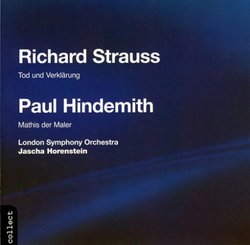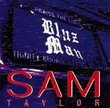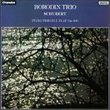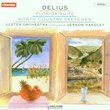| All Artists: Paul Hindemith, Richard [1] Strauss, Harold Lawrence, Jascha Horenstein, London Symphony Orchestra Title: Strauss: Tod und Verklärung; Hindemith: Mathis der Maler Members Wishing: 0 Total Copies: 0 Label: Chandos Release Date: 10/28/1992 Genre: Classical Styles: Forms & Genres, Theatrical, Incidental & Program Music, Historical Periods, Modern, 20th, & 21st Century, Symphonies Number of Discs: 1 SwapaCD Credits: 1 UPC: 095115654927 |
Search - Paul Hindemith, Richard [1] Strauss, Harold Lawrence :: Strauss: Tod und Verklärung; Hindemith: Mathis der Maler
 | Paul Hindemith, Richard [1] Strauss, Harold Lawrence Strauss: Tod und Verklärung; Hindemith: Mathis der Maler Genre: Classical
Jascha Horenstein recorded this interpretation of the symphony Mathis der Maler less than a year before he died. It is a strong and sensitively shaped reading, one that pays considerable attention to detail without losing ... more » |
Larger Image |
CD DetailsSynopsis
Amazon.com Jascha Horenstein recorded this interpretation of the symphony Mathis der Maler less than a year before he died. It is a strong and sensitively shaped reading, one that pays considerable attention to detail without losing a feeling of spontaneity. The conductor handles the awkwardly structured finale very effectively, and the performance as a whole is well played. The recording is somewhat boomy in the bass, but naturally balanced and warm. --Ted Libbey Similar CDs
|
CD ReviewsA must-listen for both the Strauss and Hindemith Santa Fe Listener | Santa Fe, NM USA | 02/27/2007 (5 out of 5 stars) "Both reviews below are unfair (or irrelevant, since the first reviewer demotes the Strauss becasue he doesn't care for the piece). If there's a single CD that could prove to a newcomer that Jascha Horenstein was a great conductor, this is it. His interpretations of Death and Transfiguration and Mathis der Maler can be praised in the same breath as being at the very top of competitive versions--they are revelatory in their total conviciton and superb, imaginative musicianship. In addition, Chandos offers these recordings in best sound, with great playing from the LSO. The Hindemith in particular is well nigh definitive. Highly reccomended. But I must offer a postscript. Horenstein was shamefully neglected for decades and only emerged as an acknowledged master in his final decade--he died in 1973. Why he was so overlooked seems puzzling until you listen to the bulk of his recordings, which are with average-to-dismal provincial orhestras, and he showed no ability to make them play better. I have no idea why he tolerated such abysmal execution--it's a trait he had in common with another great, Dmitri Mitropoulos, but to an even more distressing degree. Even now, as British critics fall over themselves praising a batch of BBC Legends recordings of Mahler and Bruckner, the objective listener hears horrendous mistakes and painfully bad exectuion. What this means is that Horenstein recordings where everything goes right are a relative rarity, making this Chandos release even more of a treasure." True to Hindemith's vision R. Casady | CA | 06/18/1999 (3 out of 5 stars) "This is the version of 'Mathis' that I grew up with. Horenstein's interpretation is fairly perfect in my opinion, vastly superior to Karajan's dirge-like exercise, particularly in the area of tempi. It's a pity the mastering on this disk isn't better; inner detail is frequently lacking and the stereo placement seems rather narrow. But still, it's all tied together by Horenstein's remarkable vision. I don't feel as well-equipped to review the Strauss work as I simply don't know it as well. On the classic LP of this pairing, the Hindemith was the featured work!" Horenstein, LSO: Richard Strauss Death & Transfiguration ton Dan Fee | Berkeley, CA USA | 06/08/2009 (5 out of 5 stars) "Kudos to Chandos for keeping this disc in the catalog, despite its age compared to the very latest release. Our conductor is Jascha Horenstein, who was good enough to be sent by Furtwaengler to prepare the orchestra for concerts the maestro would arrive later to lead. Our band is the London Symphony Orchestra, who admittedly have had their ups and downs in performance reputation, but who here must surely be judged to be having a notable upwards cycle.
Yes, Richard Strauss tone poems are something of a second-tier music these days. Damned with faint praise, if with any praise at all. I see that some reviewers have gone totally cold on him. What I continue to like very much about the best readings is how they maximize the positives of the music, while minimizing the downside, second-tier aspects. Shucks, I think the best readings of Richard Strauss make his palpable fin de siecle qualities into part of what we can still hear and appreciate in his music. Strauss was considered a modern new talent in his day, what with his tone poems replacing symphonies, and his fabulous abilities to orchestrate - even critics cannot gainsay his gifts as orchestrator? - and above all, his ways with strong tunes that would go all pop and hackneyed if handled in a large orchestra at Straussian length, by nearly anybody else of his generation. Richard Strauss famously once said that he thought an modern composer should be so deft, as to be able to indicate in his music the number of spoons laid out on a dinner table. Retrospectively, we will naturally hear such remarks as being more tongue in cheek than not. Like Sir Thomas Beecham (who was also known for his quips), Strauss often seemed to take writing big music for granted, focusing instead on how much money a particular conducting gig might earn him. With Beecham or Strauss, the ghost of Oscar Wilde seemly to be lurking, not that far off. By the last tone poem, Alpine Symphony, Strauss was heard to remark to himself, probably only too well aware that people were listening: Finally I've learned how to orchestrate. If Berlioz practically invented the modern large symphony orchestra, and if Rimsky-Korsakov amps up its lights to light show heights, surely Strauss inherited the mantle from them? I like three things about the Horenstein Death and Transfiguration. I have liked these qualities from the start. One is a fabulous edge of musical-technical discipline in the playing of all band departments, not least the LSO strings. On records this edge that nevertheless still has surprising sheen was typical, mainly of George Szell in Cleveland, and Guido Cantelli with the London Philharmonia or the old NCB Symphony. Second, I find Horenstein's pacing to be excellent, if not totally superb. I must confess that I have a soft spot for any good conductor who sets slow tempos, and then makes something meaningful out of them. Horenstein was just such a leader. Another way of getting at what Horenstein could do so expertly with tempo is to focus on musical paragraphs, not just notes played bar to bar to bar. Horenstein was a past master of playing from, playing to, playing through, and aiming the arched arrow trajectories of a composer's musical tension and release. If you are going to have to hear Richard Strauss performed, I would argue that he sounds best when played like Horenstein or Rudolf Kempe (or, more recently, Fabio Luisi in Dresden) play him. If you cannot bring yourself to sit through Horenstein doing Richard Strauss, so be it. You can get the special Horenstein experience in his Dvorak Ninth Symphony (Royal Phil), or in his Mahler (first, third, fourth). Earlier discs with Horenstein do have him at the helm of less than top-class bands. Only later in his last years in London, did Horenstein get anything like the players and the recording exposure that his talents merited. Stories have it, that major bands would gripe and refuse to play with Horenstein, because he stubbornly insisted on rehearsing them like students, playing diligently through the music's tricky spots at half-tempos. One can hear the payoffs in that Dvorak ninth. It's as brilliant, warm, and energized as anything Cantelli gave us before his untimely death. What succeeds in the Strauss does even better in the Hindemith. Again the LSO is playing at a high level. Again, Horenstein serves up that combination of edge and string sheen. Again, the ability to play whole musical paragraphs, with staying power. I like the Salonen reading of the Hindemith with the Los Angeles Philharmonic very much; but he just completely misses the agony and danger, potential to Hindemith's third movement, Temptation of Saint Anthony. To my ears, only Horenstein and William Steinberg with the Boston Symphony really go there in that movement. This disc? Highly recommended, five stars, doubtless. Get the other late career Horenstein, too. Dvorak Sym 9. Mahler 1, 3, with LSO. Mahler 4 with LPO and Margaret Price. Rachmaninoff with Earl Wild at the piano. Beethoven's violin concerto with Erich Gruenberg, and Schumann's piano concerto with Malcolm Frager. That Beethoven will take some getting used to, as it offers up an alternative sforzando emphasis, instead of our tried and true lyrical one. A Brahms first with LSO. Tchaikovsky fifth with New Philharmonia. A Brahms second plus Strauss Don Juan tone poem with the Czech Philharmonic, in stereo radio broadcast okay sound. He accompanies David Oistrakh in Bruch's Scottish Fantasia with LSO. One might even find Simpson's third symphony with LSO, and Nielsen's fifth with New Philharmonia, scouring the bins. Andrzej Panufnik with LSO." |

 Track Listings (4) - Disc #1
Track Listings (4) - Disc #1




